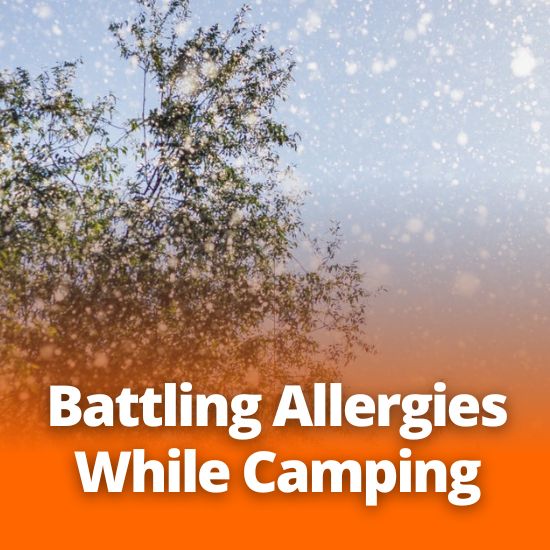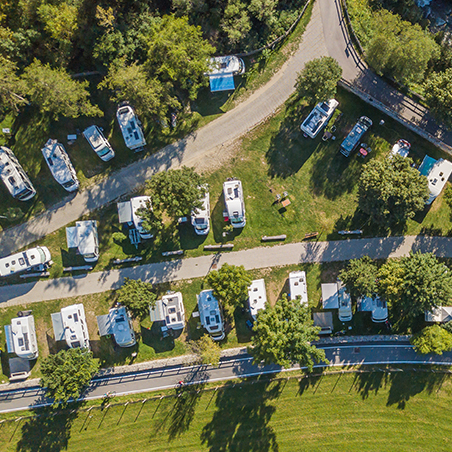
Battling Allergies While Camping
Look I’ll be frank. I have winter allergies that start up the second it snows, have like three months of sniffles from the cold, then dive right back into more allergies as springs set in (seriously, I feel like the bubble boy). It’s a nightmare and can make camping extremely difficult and something to avoid rather than enjoy.
Thankfully, there are ways I (and others) have found to minimize these effects that let myself and other allergy sufferers some respite to enjoy the great outdoors.
But where would we be if we didn’t explain the science first? (Uninterested, skip to Countering and Pre-emptive Strategies for remedies and preventative measures).
SCIENCE!

Allergies are a result of your immune system reacting (duh), so those sniffles, runny nose, irritated eyes, congested breathing – all from common airborne allergens like pollen, dust mites, pet dander, etc. Other allergens include: foods, animals, insect venom, and medication. With any varying responses people can have, anything from mild irritation and sneezing, to severe anaphylaxis and death.
On that cheery note:
Countering and Pre-emptive Strategies
But camping with allergies is not impossible, but there’s no one thing that will work for everyone (or everything). You may have to experiment a bit to find what works for you.
The key is figuring out your particular triggers which could mean you’ll have to avoid a few specific locations but that depends on your comfort level and the severity of any possible allergic reactions. Severe allergies should always be communicated with others.
Make sure anyone you’re RVing with is aware of any serious allergies, if/where any medication you have is kept, and how to administer it if necessary – like an epi-pen for example.
Know Your Allergens
Like we said: know what you’re allergic to, communicate it to others, have the proper precautions in place to counteract any severe reactions.
Be Campsite Smart
Simply: if you know you’re allergic to certain flowers, don’t camp near them. Unfortunately, most campgrounds won’t have the specific flora listed campsite by campsite so if you do have a serious concern, you’ll have to contact the campground before making your reservation and discuss the situation with them to enquire about any potential issues. If you’re nice about it, they may volunteer to check the site and confirm if it will work for you.


Allergy Essentials:
- Tissues
- Hand sanitizer
- Wet wipes
- Allergy compatible foods
Weather
I like a sunny day as much as the next camper, but those aren’t always the best for the allergy inflicted. Rainy and overcast weather can be great for the allergically-inclined as they typically have lower pollen count, amongst other allergens.
On the other hand, sunny and windy days can be the absolute worst. They can have a far higher pollen level. Some times of year might be best to avoid in particular.
Allergy Meds
Keep allergy medication on hand. Some clinics will offer year-long doses of allergy medications, but some over-the-counter antihistamines can also work – but a prescription is going to be required for the really potent stuff.
Of course, and you know who you are, some allergies require having an epi-pen on hand. I’ll say it again: make sure others know how to use it in the case you’re unable to.
Allergy Proof Your RV
A tent, camp chairs, blankets, and other essentials left in storage can gather pollen, dust, even mold. All of which can cause an allergic reaction. Set up any tents beforehand to clean and air out, wash any blankets that have been sitting, and generally clean up and prepare anything that could have done some unhealthy ‘woolgathering’ before packing them up for your trip.
You can invest in hypoallergenic bedding, like pillows or mattress covers, which can help significantly in keeping dust mites and other allergens away.
Medical Facilities
Worst comes to worst, you should know where the nearest emergency medical facility is. If the risk of a severe reaction is high enough it would be in the best interest of everyone to scout them beforehand (actually, know where emergency vets are too in case you have any pets at risk).
Write down locations, directions, and even phone numbers, and have them easily accessible just in case.
So should you go camping with allergies?
Short answer: if you’ve taken the proper steps and planned, you can still have an awesome time! We’ve all had allergy flare-ups in the worst moment but, if we take the right medication and have the proper awareness there should be nothing holding back your wanderlust!
Do you have any tips for avoiding allergies while camping?
